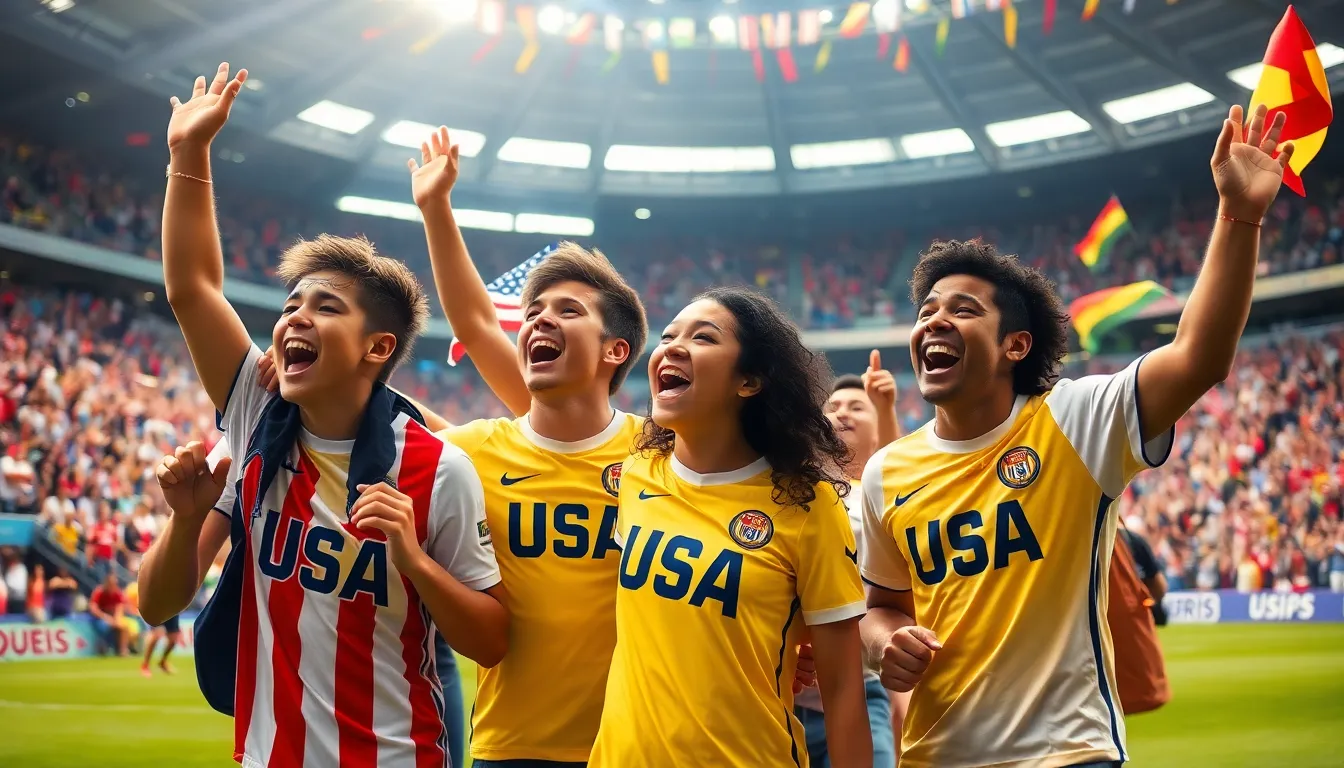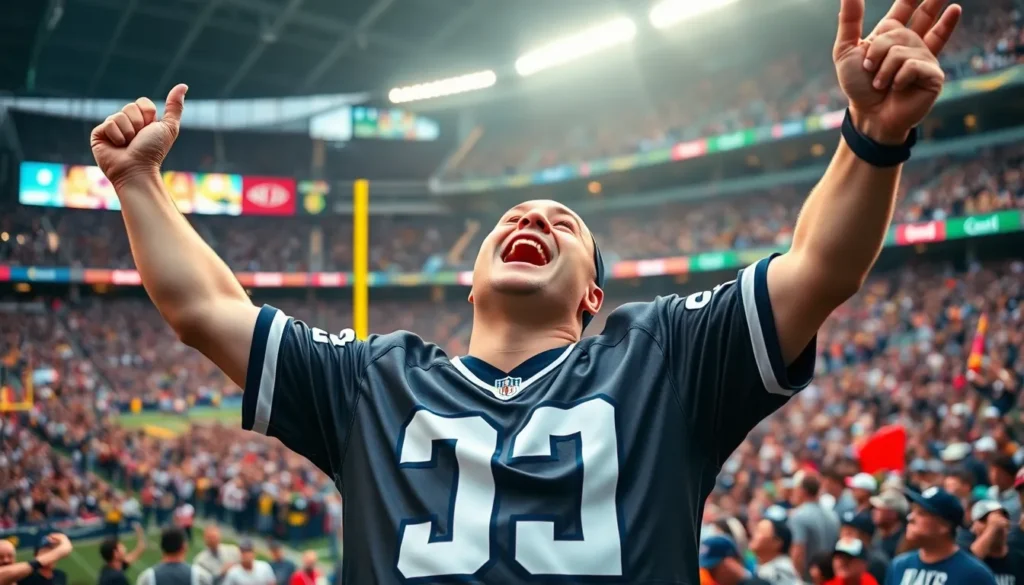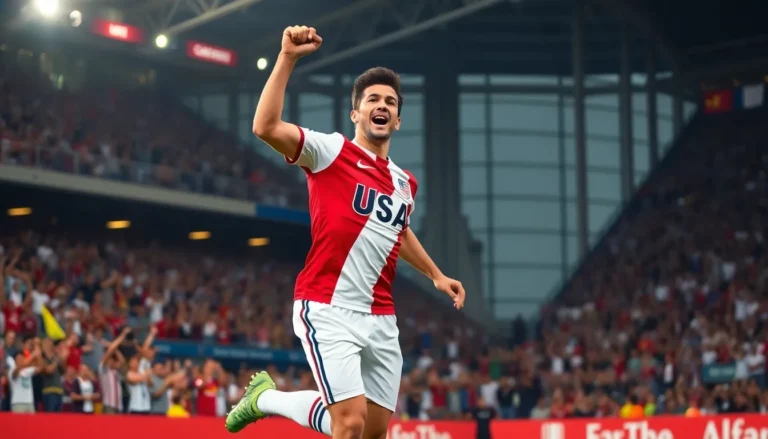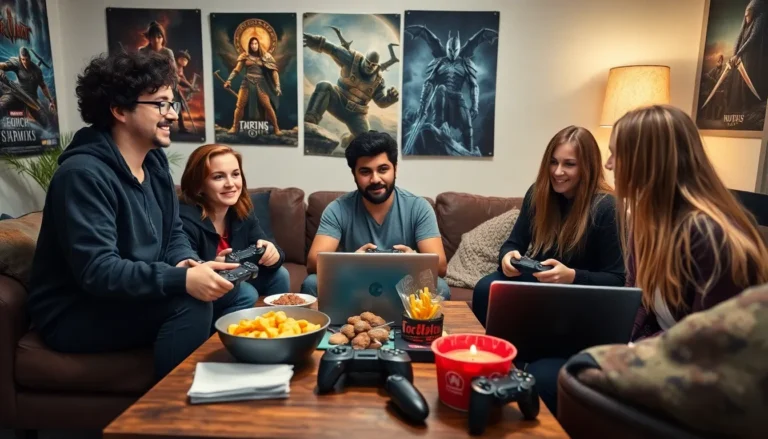Table of Contents
ToggleThe FIFA soundtrack has become a cultural phenomenon, transcending the boundaries of gaming and music. Each annual release not only showcases a diverse array of artists but also captures the vibrant spirit of the world’s most beloved sport. From indie hits to international chart-toppers, the FIFA soundtrack introduces players to fresh sounds while enhancing their gaming experience.
For fans and players alike, these carefully curated tracks evoke memories of epic matches and unforgettable moments on the pitch. The music serves as a backdrop to the excitement of gameplay, making it an integral part of the FIFA franchise. As the game evolves, so does its soundtrack, reflecting the changing landscape of global music and the ever-growing passion for football.
Overview of FIFA Soundtrack
The FIFA soundtrack plays a crucial role in enhancing the gaming experience and reflecting the cultural landscape of football. Each year’s soundtrack includes a diverse range of genres and international artists, appeals to various audiences, and celebrates global music trends. Tracks are selected for their ability to resonate with fans, blending contemporary hits with emerging talents.
The compilation often features over 40 songs from artists worldwide, ensuring a rich auditory experience. Examples include tracks from popular artists like Dua Lipa and The Weeknd, alongside lesser-known acts that gain exposure through the franchise. This vibrant mix contributes to memorable gameplay moments during pivotal matches.
Since its inception, the FIFA soundtrack has evolved, mirroring the dynamic nature of music and the sport itself. The annual releases not only accompany gameplay but also create lasting associations in players’ minds, linking specific tracks to their personal gaming experiences. As the franchise continues to grow, the soundtracks remain an integral part of its identity.
Historical Significance of FIFA Soundtrack

The FIFA soundtrack holds substantial historical significance within both the gaming and music industries. Its evolution reflects changes in musical trends and cultural shifts, driving engagement among players and fans alike.
Evolution Through the Years
The FIFA soundtrack has evolved significantly since its debut in 1998. Each annual release expands the musical landscape, introducing fresh genres and artists. From early editions featuring rock and pop anthems to recent compilations showcasing hip-hop and electronic music, the soundtrack adapts to contemporary tastes. Notable milestones include collaborations with renowned musicians and the inclusion of tracks that align with major football events. The soundtrack has consistently mirrored the global influence of football and music, fostering a sense of unity among diverse audiences.
Impact on Gaming Culture
The FIFA soundtrack actively shapes gaming culture by enhancing the emotional connection players share with the game. Iconic tracks become synonymous with thrilling gameplay moments, imprinting vibrant memories associated with teams and victories. This connection fosters a broader cultural recognition, where songs from the soundtrack gain popularity outside of the gaming realm. Furthermore, the soundtrack serves as a gateway for players to discover new music, elevating lesser-known artists on a global platform. Overall, the FIFA soundtrack plays a crucial role in shaping the soundscape of gaming while influencing broader musical trends.
Notable Tracks in FIFA Soundtrack
FIFA soundtracks encompass a rich blend of musical diversity, with various genres and artists that leave a lasting impression on players and fans alike.
Popular Genres Represented
- Electronic Dance Music (EDM): This genre frequently appears in FIFA soundtracks, energizing gameplay with upbeat rhythms. Tracks by artists like Calvin Harris and David Guetta exemplify this trend.
- Hip-Hop: The influence of hip-hop grows each year. Artists such as Drake and Kendrick Lamar bring fresh perspectives, enhancing the emotional intensity of gameplay.
- Indie Rock: Indie rock features prominently, showcasing emerging talent and established bands. Notable tracks by Arctic Monkeys and Vampire Weekend resonate with players, offering an alternative sound.
- Pop: Pop music’s mainstream appeal ensures widespread recognition. Songs by Dua Lipa and The Weeknd capture mainstream audiences, enhancing the gaming experience for many players.
- Reggae and World Music: FIFA incorporates global sounds, including reggae and various international styles. These selections provide cultural richness, reflecting the global nature of football.
Memorable Artists and Collaborations
- Dua Lipa: Her track “Don’t Start Now” gained immense popularity, contributing to a vibrant gaming atmosphere.
- The Weeknd: Known for his distinctive sound, his collaboration on the FIFA soundtrack aligns perfectly with the game’s dynamic energy.
- Tame Impala: This Australian band offers a unique sound, with hits like “Let It Happen” encapsulating the spirit of exploration in gameplay.
- Major Lazer: Their collaboration with various artists introduces infectious dance tracks, enhancing the excitement of in-game moments.
- Björk: Featuring her unique style within the FIFA soundtrack showcases the commitment to diverse musical experiences.
- Cypress Hill: Their hip-hop roots bring a gritty edge, effectively enhancing the competitive atmosphere of FIFA matches.
These tracks and their respective artists not only enrich the FIFA soundtracks but also contribute to a global conversation about music and culture in gaming.
Influence on Football and Music
The FIFA soundtrack significantly impacts both the football and music industries, merging cultures and communities while promoting emerging artists worldwide.
Bridging Cultures and Communities
The FIFA soundtrack creates a cultural bridge, connecting diverse audiences through a shared love for music and football. Tracks from various genres resonate with fans, transcending linguistic and geographical boundaries. By featuring artists from different countries, the soundtrack embodies a global spirit, fostering unity among players and fans. For instance, the inclusion of reggaeton, hip-hop, and Afrobeat tracks appeals to a wide range of listeners, enhancing the collective experience of celebrating the sport. This intercultural exchange encourages appreciation of diverse music styles while erasing barriers between different communities.
Launching Music Careers
The FIFA soundtrack serves as a launching pad for many artists. By showcasing talent from lesser-known musicians alongside established stars, exposure within the FIFA brand generates opportunities for growth. Artists such as Hozier and Sia gained recognition through their contributions to the soundtracks. The global reach of the FIFA franchise allows emerging artists to connect with wider audiences, often leading to increased streaming and sales. Consequently, the soundtrack not only enriches the gaming experience but also cultivates the careers of many musicians, solidifying its role in the modern music landscape.
The FIFA soundtrack stands as a testament to the powerful intersection of music and gaming. It not only enhances the gameplay experience but also fosters a deeper connection among players and fans. By celebrating diverse musical styles and emerging talents, it creates a vibrant cultural tapestry that resonates globally.
As the franchise continues to evolve, its soundtracks will likely remain a vital part of both the gaming and music landscapes. The impact of these carefully curated tracks extends beyond the virtual pitch, shaping musical trends and offering a platform for artists to reach new audiences. The FIFA soundtrack is more than just a collection of songs; it’s a cultural phenomenon that unites people through the universal language of music.







